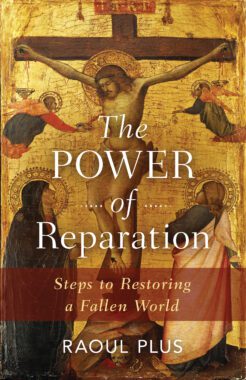A Reflection from “The Power of Reparation” by Raoul Plus
People are too prompt to think that, in order to consecrate themselves to a life of reparation, they must necessarily live in a cloister, practicing silence and the most severe austerities of Christian penance. This is a mistake. Reparation is not so much the observance of certain fixed practices as a spirit which adapts itself readily to any mode of life, provided it be truly Christian.
“The spirit of reparation.” Hence, before all, it is necessary to bring home to ourselves and to weigh the fact that our Lord was crucified—crucified for us—and that we must help Him; to discover those around us—and how many there are!—who are being lost. This seems a small matter, but how many Christians know nothing about it! If we live guided by these two great thoughts, we possess the spirit of reparation.
As Chanoine Leroux of Brittany writes: “The life of reparation is not in itself a particular form of the Christian life,” yet it is not the common life found among all Christians. Why not? Because, on the one hand, we should try to realize what the Christian ideal really means, and this is rarely done. On the other hand, “all those who are drawn to seek holiness do not all look at it from this particular point of view.”
But no sooner do we possess this spirit of reparation than we see all that it demands of us. We realize that, above all, we must be true to our baptismal vows, and keep the commandments of God and of the Church, not with a fidelity such as the generality of Christians offer God, but with an observance more integral and precise, without bargaining with God or seeking pretexts for escaping from our obligations. To serve God thus loyally in our private, social, and domestic life already opens out wide vistas.
An American author has written a story called In His Footsteps. The story commences with a minister who is preaching his Sunday sermon on 1 Peter 2:21: “Unto this are you called, because Christ also suffered for us, leaving you an example, that you should follow His steps.” He delivered his sermon, to which his audience listened with their customary respect, but suddenly an old beggar interrupted him by calling out: “What! are you not ashamed? You dare to sing,
Jesus, I my cross have taken
And left all to follow Thee,
and yet live as you do!” Having said this, the beggar fell down dead. There was great consternation among the audience, greater still in the soul of the pastor. On the following Sunday, he proposed to his flock that they should form an association. Each member was to engage seriously for one year to ask himself, before each action: “What would Jesus Christ do in these circumstances were He in my place?”
A fair number joined the association—merchants, journalists, politicians, and so on. No sooner have they pledged their word than they find that they must change their lives. A certain Mr. Norman, editor of the local newspaper, is one of the members. They bring him an article on the races—three and a half columns of print. He asks himself: “If Christ were the editor of this journal, would He allow this article to stand as it is?” He decides in the negative, and the article is destroyed. The same fate overtakes other articles, political, commercial, and likewise some advertisements, with the result that the journal ceases to exist.
We see the gist of this story and its exaggerations, but we can profitably retain something of the underlying principle. How perfect would be our Christian life if, like these imaginary personages of this American story, we were to ask ourselves before each action: Were Jesus in my place and in these circumstances, how would He have acted? It is easy to see what a sudden change this would effect in the conduct of individuals, in relations between nations, in the life of families and of society.
A writer dealing with the question of the fall in the birth rate—a vital matter in these days, and one which convicts many Catholics of having failed in their duty—gives this title to his book: France Repeopled by Practical Catholics. The title suggests a scheme while passing a sentence of condemnation.
In no sphere can reparation be made except by the assistance of true Christians. These must not fail to accomplish their task; they must be Christians to the backbone, fearless and “shameless,” as Louis Veuillot explains.
Generous souls will always find numerous occasions of practicing their faith to the point of sacrifice. In an earlier chapter, we have blamed the tendency, so common with many, to seek the least discomfort possible in their religion. Cardinal Manning writes: “We live in easy times. Who fasts nowadays? Undoubtedly the Church is very indulgent. Nevertheless, at the present time, the Jews keep strict fasts annually, taking no food from sunrise to sunset, a sharp reproof to us who are disciples of Jesus Crucified.”
What terrible sufferings some of our soldiers had to endure during the recent war! For example, the Marine Fusiliers, who, during the famous campaign of Dixmude, had to stand in water for twenty-six days, with no other food than some tins of jam. Doubtless the cause for which they suffered was worth the pain, but is the cause of Christ less noble, though for this we dole out our sacrifices? Look around! See what men endure for the world, for fashion. And we ourselves, what are we doing for souls, for Jesus Christ?
The crucifixes that please us must be artistic, not too harrowing, made of ivory, mounted on velvet. But remember, these are not the true ones. The real crucifix is rough and it hurts.
To purchase this book, please visit one of the links below.
_

This article on ‘Christian Growth is Supposed to be Uncomfortable’ is adapted from the book The Power of Reparation by Raoul Plus which is available from Sophia Institute Press.
Art for this post on a reflection from “The Power of Reparation” by Raoul Plus; cover used with permission; Photo used in accordance with Fair Use practices.




